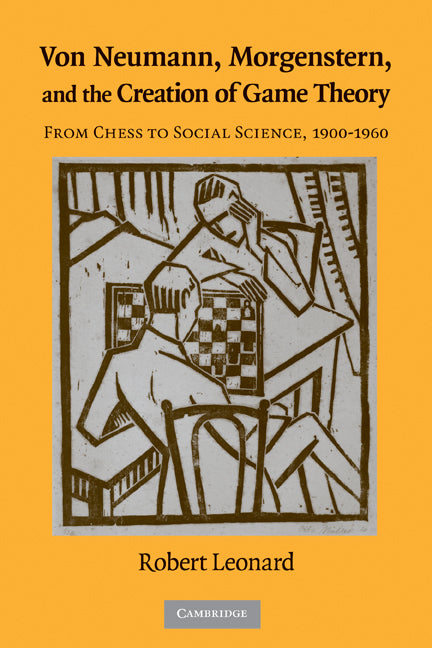Freshly Printed - allow 8 days lead
Couldn't load pickup availability
Von Neumann, Morgenstern, and the Creation of Game Theory
From Chess to Social Science, 1900–1960
A reconstruction of the creation of game theory in the twentieth century by John von Neumann and Oskar Morgenstern.
Robert Leonard (Author)
9780521562669, Cambridge University Press
Hardback, published 28 June 2010
424 pages
22.9 x 16 x 3.6 cm, 0.79 kg
'Von Neumann and Morgenstern's landmark 1944 book, Theory of Games and Economic Behavior, has long proven enigmatic. As is well known, the book's immediate impact on economic theory was minor, yet it has been widely cited as the inspiration for game theory as it has infiltrated economics since the 1980s … What is clear is that [this] book represents immense achievement in the way it links the histories of science, economics, and cultural and social history through the early careers of John von Neumann and Oskar Morgenstern. To a broader audience, its attention to social and political context will make parts of the book read like a page-turner, while it will remain a rich resource for the scholarly initiate.' Journal of Economics and Philosophy
Drawing on a wealth of archival material, including personal correspondence and diaries, Robert Leonard tells the fascinating story of the creation of game theory by Hungarian Jewish mathematician John von Neumann and Austrian economist Oskar Morgenstern. Game theory first emerged amid discussions of the psychology and mathematics of chess in Germany and fin-de-siècle Austro-Hungary. In the 1930s, on the cusp of anti-Semitism and political upheaval, it was developed by von Neumann into an ambitious theory of social organization. It was shaped still further by its use in combat analysis in World War II and during the Cold War. Interweaving accounts of the period's economics, science, and mathematics, and drawing sensitively on the private lives of von Neumann and Morgenstern, Robert Leonard provides a detailed reconstruction of a complex historical drama.
Introduction
Part I. Struggle and Equilibrium: From Lasker to von Neumann: 1. 'The strangest states of mind': chess, psychology and Emanuel Lasker's Kampf
2. 'Deeply rooted yet alien': Hungarian Jews and mathematicians
3. From Budapest to Göttingen: an apprenticeship in modern mathematics
4. 'The futile search for the perfect formula': von Neumann's minimax theorem
Part II. Oskar Morgenstern and Interwar Vienna: 5. Equilibrium on trial: the young Morgenstern and the Austrian school
6. Wrestling with complexity: Wirtschaftsprognose and beyond
7. Ethics and the excluded middle: Karl Menger and social science
8. From Austroliberalism to Anschluss: the Viennese economists in the 1930s
Part III. From War to Cold War: 9. Mathematics and the social order: von Neumann's return to game theory
10. Ars combinatoria: writing the theory of games
11. Morgenstern's catharsis
12. Von Neumann's war
13. Social science and the 'present danger': game theory and psychology at the RAND Corporation, 1946–60
Conclusion.
Subject Areas: Economic history [KCZ], Behavioural economics [KCK], Microeconomics [KCC]


